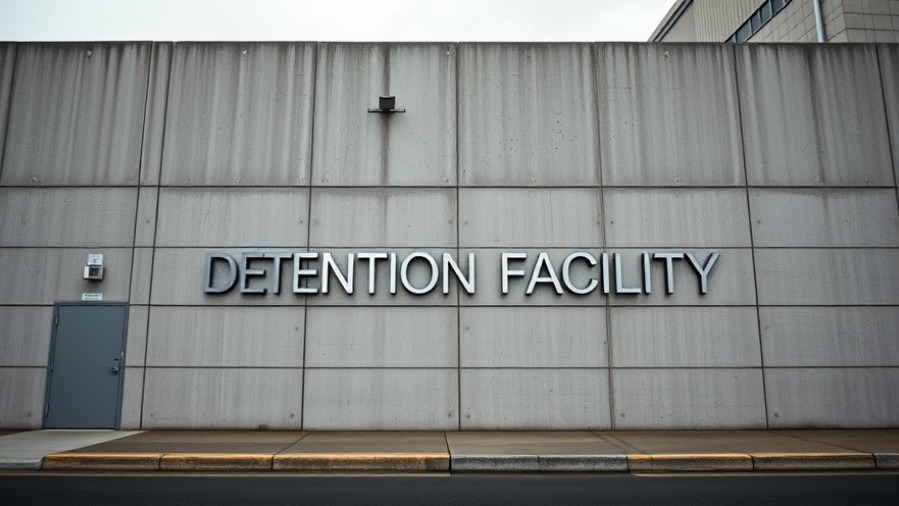
Understanding the Mental Health Crisis in Clay County Jail
The Clay County Detention Center is taking an unprecedented step towards addressing the critical intersection of mental health and the criminal justice system. As nearly a third of its 400 inmates are deemed mentally incompetent, the facility, in collaboration with the Missouri Department of Mental Health Services, is launching a jail-based competency program. This initiative aims to ensure that inmates receive proper mental evaluations during their wait for trial, reinforcing their constitutional rights under the 6th Amendment—an essential safeguard for a fair and speedy judicial process.
In 'Clay County aids in jail-based mental health program', the discussion dives into mental health initiatives within the Clay County Detention Center, exploring key insights that sparked deeper analysis on our end.
How the Jail-Based Competency Program Works
This pilot program is unique in the Kansas City metro area, specifically designed to bring mental health services to inmates, rather than sending them to distant state mental health hospitals, such as the one located in Fulton, Missouri. Sarah Boyd, the public relations manager for the Clay County Sheriff’s Office, emphasized that this program does not incur additional direct costs to the county, although it may require housing some inmates in other jails due to space issues.
To illustrate, the detention center can accommodate around ten inmates through this initiative, enhancing support for individuals facing mental health issues while awaiting trial. Currently, the program has successfully enrolled two inmates, providing them with the necessary treatment and medication to help them regain the ability to understand the charges they face.
The Impact of Mental Health in Local Communities
The implications of addressing inmate mental health extend far beyond the walls of the detention center. By ensuring fair treatment for all individuals, regardless of their mental state, Clay County aims to foster a more just legal system. It's not just about recovering individuals; it’s about strengthening the fabric of the community. When inmates receive the treatment they need, it allows for better reintegration into society, potentially reducing recidivism rates and fostering safer Kansas City neighborhoods.
Broader Context: Why This Initiative Matters Now
Current events have made it particularly clear that mental health is a pressing issue across many communities in Kansas City and beyond. The COVID-19 pandemic has exacerbated mental health problems nationwide, leading to increasing recognition of the need for mental health services in various sectors, including correctional facilities. Programs like the one in Clay County not only help individuals but also signify a pivotal shift towards understanding mental health as a crucial aspect of public health and safety.
The Future of Mental Health Services in Clay County
As the pilot program develops, there is a strong desire from the county officials to prioritize serving Clay County inmates before potentially expanding the initiative to help regional detention centers. The hope is to normalize mental health care in jails, serving as a model for other jurisdictions in Missouri.
With only one clinician currently involved, there are plans for growth as the need becomes increasingly evident. Conversations around budget allocations to ensure adequate mental health staffing could help shape the program into a comprehensive support system for those grappling with mental health issues who find themselves entangled in the justice system.
Community Engagement and Support
For local residents who care about their Kansas City neighborhoods, understanding the implications of this initiative is essential. Engaging with community events and discussions around mental health can provide opportunities for residents to support those struggling in their community. Initiatives like the jail-based competency program serve as a reminder of the importance of mental health awareness and advocacy in local living, especially as it pertains to the KC urban lifestyle.
Moreover, as residents, you can also play a vital role by being part of the conversation regarding neighborhood resources for mental health and wellness. This could include attending local events or participating in community discussions, further emphasizing the need for inclusive support systems.
Get Involved: Share Your Thoughts
As Kansas City evolves, adapting to the challenges posed by mental health in correctional facilities is just one of the ways it manifests. The Clay County Detention Center’s latest initiative illustrates a growing recognition of the importance of treating mental health within the criminal justice framework. Have a story to share or want to contact us for more details? Drop us an email at team@kansascitythrive.com and join the conversation.
 Add Row
Add Row  Add
Add 




Write A Comment